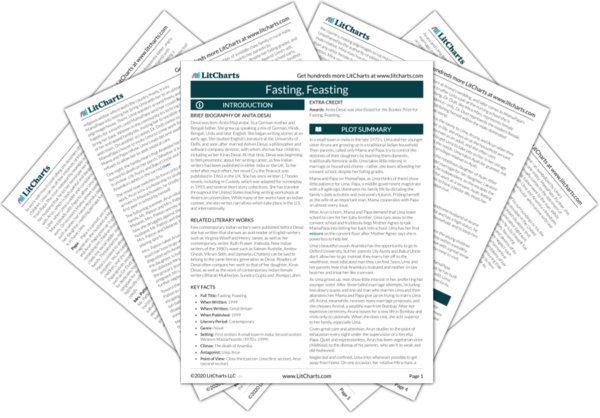Arun Quotes in Fasting, Feasting
He had at last experienced the total freedom of anonymity, the total absence of relations, of demands, needs, requests, ties, responsibilities, commitments. He was Arun. He had no past, no family, and no country.
No, he had not escaped. He had travelled and he had stumbled into what was like a plastic representation of what he had known at home; not the real thing—which was plain, unbeautiful, misshapen, fraught and compromised—but the unreal thing—clean, bright, gleaming, without taste, savour or nourishment.
When she finally brought herself to tell him that Arun was a vegetarian and she herself had decided to give it a try (…) he reacted by not reacting, as if he had simply not heard, or understood. That, too was something Arun knew and had experience of (…)—his father’s very expression, walking off, denying any opposition, any challenge to his authority…
We don’t sit down to meals like we used to. Everyone eats at different times and wants different meals. We just don’t get to eating together much now that they’re grown. So I just fill the freezer and let them take down what they like, when they like. Keeping the freezer full—that’s my job, Ahroon.
Arun gets out of the way, quickly: one can’t tell what is more dangerous in this country, the pursuit of health or of sickness.
Then Arun does see a resemblance to something he knows: a resemblance to the contorted face of an enraged sister who, failing to express her outrage against neglect, against misunderstanding, against inattention to her unique and singular being and its hungers, merely spits and froths in ineffectual protests.
But what is plenty? What is not? Can one tell the difference?
Now that he is contributing to the din, he begins to feel pleased. Surprisingly, it is due to the water, an element that removes him from his normal self, and opens up another world of possibilities.
They are not the stuff of dreams or even cinema: he is not the hero, nor she the heroine, and what she is crying for, he cannot tell (…) this is a real pain and a real hunger. But what hunger does a person so sated feel?

Arun Quotes in Fasting, Feasting
He had at last experienced the total freedom of anonymity, the total absence of relations, of demands, needs, requests, ties, responsibilities, commitments. He was Arun. He had no past, no family, and no country.
No, he had not escaped. He had travelled and he had stumbled into what was like a plastic representation of what he had known at home; not the real thing—which was plain, unbeautiful, misshapen, fraught and compromised—but the unreal thing—clean, bright, gleaming, without taste, savour or nourishment.
When she finally brought herself to tell him that Arun was a vegetarian and she herself had decided to give it a try (…) he reacted by not reacting, as if he had simply not heard, or understood. That, too was something Arun knew and had experience of (…)—his father’s very expression, walking off, denying any opposition, any challenge to his authority…
We don’t sit down to meals like we used to. Everyone eats at different times and wants different meals. We just don’t get to eating together much now that they’re grown. So I just fill the freezer and let them take down what they like, when they like. Keeping the freezer full—that’s my job, Ahroon.
Arun gets out of the way, quickly: one can’t tell what is more dangerous in this country, the pursuit of health or of sickness.
Then Arun does see a resemblance to something he knows: a resemblance to the contorted face of an enraged sister who, failing to express her outrage against neglect, against misunderstanding, against inattention to her unique and singular being and its hungers, merely spits and froths in ineffectual protests.
But what is plenty? What is not? Can one tell the difference?
Now that he is contributing to the din, he begins to feel pleased. Surprisingly, it is due to the water, an element that removes him from his normal self, and opens up another world of possibilities.
They are not the stuff of dreams or even cinema: he is not the hero, nor she the heroine, and what she is crying for, he cannot tell (…) this is a real pain and a real hunger. But what hunger does a person so sated feel?











